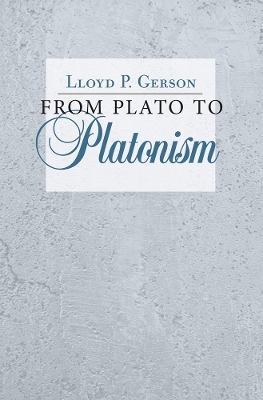
From Plato to Platonism
Cornell University Press (Verlag)
978-0-8014-5241-3 (ISBN)
Was Plato a Platonist? While ancient disciples of Plato would have answered this question in the affirmative, modern scholars have generally denied that Plato’s own philosophy was in substantial agreement with that of the Platonists of succeeding centuries. In From Plato to Platonism, Lloyd P. Gerson argues that the ancients were correct in their assessment. He arrives at this conclusion in an especially ingenious manner, challenging fundamental assumptions about how Plato’s teachings have come to be understood. Through deft readings of the philosophical principles found in Plato's dialogues and in the Platonic tradition beginning with Aristotle, he shows that Platonism, broadly conceived, is the polar opposite of naturalism and that the history of philosophy from Plato until the seventeenth century was the history of various efforts to find the most consistent and complete version of "anti-naturalism."Gerson contends that the philosophical position of Plato—Plato’s own Platonism, so to speak—was produced out of a matrix he calls "Ur-Platonism." According to Gerson, Ur-Platonism is the conjunction of five "antis" that in total arrive at anti-naturalism: anti-nominalism, anti-mechanism, anti-materialism, anti-relativism, and anti-skepticism. Plato’s Platonism is an attempt to construct the most consistent and defensible positive system uniting the five "antis." It is also the system that all later Platonists throughout Antiquity attributed to Plato when countering attacks from critics including Peripatetics, Stoics, and Sceptics. In conclusion, Gerson shows that Late Antique philosophers such as Proclus were right in regarding Plotinus as "the great exegete of the Platonic revelation."
Lloyd P. Gerson is Professor of Philosophy at the University of Toronto. He is the author of many books, including Aristotle and Other Platonists, also from Cornell, and Knowing Persons: A Study in Plato, and editor of The Cambridge History of Philosophy in Late Antiquity.
Preface
Acknowledgments
Part 1. Plato and His Readers
1. Was Plato a Platonist?
Plato and Platonism
Ur-Platonism
From Plato to Platonism
2. Socrates and Platonism
The 'Socratic Problem'
Gregory Vlastos
Terry Penner
Christopher Rowe
3. Reading the Dialogues Platonically
Plato and Developmentalism
Plato the Artist, Plato the Philosopher
Plato’s Self-Testimony
4. Aristotle on Plato and Platonism
Aristotle and Ur-Platonism
Aristotle’s Testimony on the Mathematization of Forms
Aristotle’s Criticism of the Mathematization of Forms
Part 2. The Continuing Creation of Platonism
5. The Old Academy
Speusippus and First Principles
Speusippean Knowledge
Xenocrates
6. The Academic Skeptics
What Is Academic Skepticism?
Skepticism, Rationalism, and Platonism
7. Platonism in the ‘Middle’
Antiochus of Ascalon
Plutarch of Chaeronea
Alcinous
8. Numenius of Apamea
On the Good
Part 3. Plotinus: "Exegete of the Platonic Revelation"
9. Platonism as a System
The First Principle of All
Intellect
Soul
Matter
10. Plotinus as Interpreter of Plato (1)
Matter in the Platonic System
Substance and Becoming
Categories in the Intelligible World
The One and the Indefinite Dyad
The Good Is Eros
11. Plotinus as Interpreter of Plato (2)
Human and Person
Assimilation to the Divine
Moral Responsibility
Conclusion
Bibliography
| Verlagsort | Ithaca |
|---|---|
| Sprache | englisch |
| Maße | 155 x 235 mm |
| Gewicht | 907 g |
| Themenwelt | Geisteswissenschaften ► Philosophie ► Philosophie Altertum / Antike |
| ISBN-10 | 0-8014-5241-4 / 0801452414 |
| ISBN-13 | 978-0-8014-5241-3 / 9780801452413 |
| Zustand | Neuware |
| Haben Sie eine Frage zum Produkt? |
aus dem Bereich


